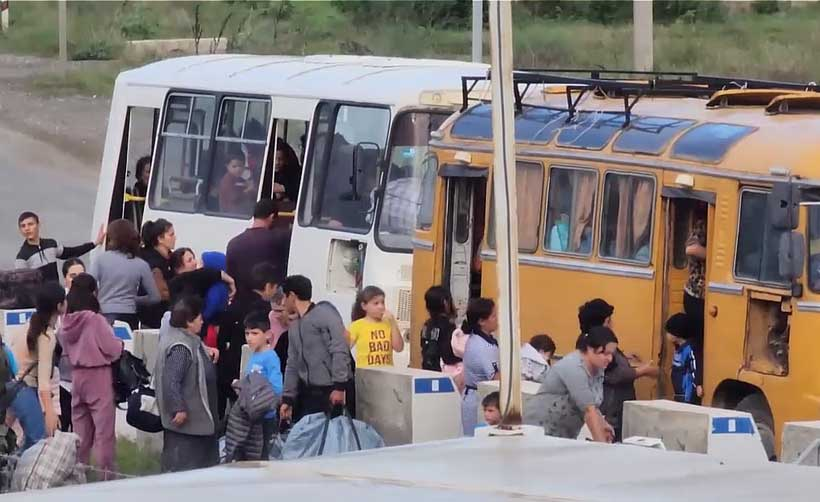The Exiled Armenians of Nagorno-Karabakh Deserve to Return
- Vartan Oskanian, Modern Diplomacy
- Jul 5, 2025
- 4 min read
In 2023, over 120,000 ethnic Armenians were displaced from Nagorno-Karabakh—a region their ancestors had inhabited for millennia.

The recent war between Iran and Israel reminded the world that the Middle East and its peripheries remain perilously unstable. But the United States should not focus on this one conflict alone—and nowhere is neglect more visible and potentially costly than in the South Caucasus, the area that borders Iran to the north.
In 2023, over 120,000 ethnic Armenians were displaced from Nagorno-Karabakh—a region their ancestors had inhabited for millennia. This was a calculated elimination of a population and the destruction of a self-governing entity—the Republic of Artsakh—through blockade, military assault, and coerced depopulation. Yet the world barely flinched.
The West has long viewed the South Caucasus as a strategic corridor—a vital passage for Caspian energy, a counterbalance to Russia, and a geopolitical buffer abutting Iran. But Washington’s and Brussels’s muted response to the erasure of Nagorno-Karabakh sent a terrible message to the world: that such ethnic cleansing can occur without consequence if the aggressor is geopolitically useful.
The displaced Armenians did not simply flee a war zone. They endured a ten-month blockade that strangled daily life, followed by a rapid military offensive and the arrest of remaining local leaders—now held unlawfully in Baku. No independent investigation has taken place. No international enforcement mechanism has been applied. No safe pathway has been secured for return.
Crucially, on November 17, 2023, the International Court of Justice (ICJ) ordered Azerbaijan to guarantee the “safe, unhindered, and expeditious return” of Armenians who fled. The ruling mandates protection against force or intimidation. But while the ICJ’s decision has clear legal and moral weight, it lacks enforcement power. It is up to the international community—and mainly the West—to act on it.
The people and leadership of Nagorno-Karabakh are pragmatic. They acknowledge the current political and military realities. They do not seek to resurrect the Republic of Artsakh by force, nor to deny the geopolitical facts on the ground. Their goal is a collective, voluntary return to their ancestral homeland, under conditions that ensure safety, dignity, and rights. Those conditions could emerge through an international transitional administration, credible autonomy guarantees, or a monitored reintegration.
Yes, many displaced Armenians today say they cannot return under Azerbaijani sovereignty—and understandably so. The trust deficit is enormous. But that does not negate the legal and moral imperative of the right of return. What’s needed is the creation of credible guarantees: international monitors, security assurances, legal protections, and institutional mechanisms for enforcing rights on the ground. With those in place, the overwhelming majority of the displaced would be willing to return.
Unfortunately, without pressure, there is no reason to believe Baku will permit any of this. Some in the West argue that the conflict is over—that Nagorno-Karabakh is now under full Azerbaijani control and that Armenians must simply move on. But accepting this logic does more than abandon one people’s rights. It emboldens others to believe they too can redraw maps and erase communities with impunity.
Indeed, this permissiveness sets the stage for the next crisis.
The next likely flashpoint is Syunik, the southern province of Armenia that borders Iran and physically blocks Azerbaijan from its exclave of Nakhichevan. Both Baku and Ankara have openly demanded the creation of a “Zangezur Corridor” through this region. Such a corridor would sever Armenia’s direct land access to Iran and severely compromise its sovereignty. For Tehran, too, this is a red line. Iranian leaders have made clear that they will not tolerate any change to the Armenia-Iran border. Yet the failure to hold Azerbaijan accountable for its actions in Nagorno-Karabakh has created a tinderbox.
To avoid a wider war, the West should enact specific, strategic policies:
Demand the release of Armenian political detainees currently held in Baku;
Support international monitoring missions to ensure conditions for safe return;
Condition military and diplomatic cooperation with Azerbaijan on concrete human rights benchmarks;
Appoint a special envoy to the South Caucasus, tasked with preventing further escalation and promoting sustainable peace;
Publicly back mediation initiatives, like the recent Swiss parliamentary resolution calling for direct dialogue between Azerbaijani authorities and displaced Artsakh representatives.
Yes, there are constraints that will shape policy. Azerbaijan is valued as an alternative energy supplier amid efforts to reduce dependence on Russian gas. Its proximity to Iran—and its cooperation with Israel—make it an attractive security partner. Its alliance with Turkey, a NATO member, further complicates matters.
But none of these considerations justify silence in the face of ethnic cleansing and the destruction of a self-governing democratic entity. Strategic interests will probably not be abandoned—but neither should they be allowed to override universal principles. The credibility of Western commitments to human rights is on the line.
The ICJ’s ruling and the emerging diplomatic efforts from countries like Switzerland all point in one direction: the world recognizes what happened in Nagorno-Karabakh as a violation of international law. The only question now is whether those norms will be enforced—or allowed to wither in the face of realpolitik.
A just and durable peace in the South Caucasus will require the return of displaced people, the release of political prisoners, and a reaffirmation that the rules of international conduct apply to all states equally. History will remember not only what we said about Ukraine, Gaza, or Tehran—but also what we failed to say and do in Nagorno-Karabakh.
(c) 2025, Modern Diplomacy
.png)



Comments